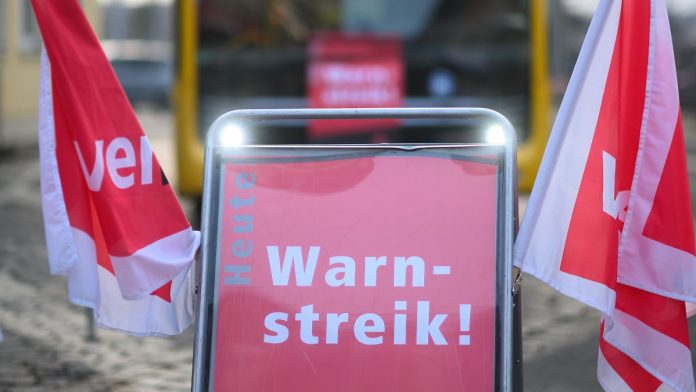Only one federal state was spared
Verdi announces a wave of strikes on buses and trains
This audio version was artificially generated. More info | Send feedback
The list of industrial disputes in the transport sector is getting longer in this young year. The Verdi union is calling for warning strikes in public transport nationwide next week. The climate movement Fridays For Future is also on board again.
The Verdi union is calling for warning strikes in local public transport nationwide next week. As the union in Berlin announced, the labor disputes are planned on different days regionally, with March 1st as the main strike day. Bavaria is the only federal state not affected.
The date has already been set in Hamburg: The employees of the Hochbahn and the Verkehrsbetriebe Hamburg-Holstein GmbH (VHH) have been called on a week from Thursday for a 48-hour warning strike. The work stoppage will begin at 3 a.m. on Thursday and end at 3 a.m. on Saturday, the union said. The night buses from Friday to Saturday are also affected. In Saarland, a warning strike is planned for Monday (February 26th) from the start of work until the end of the shift.
In North Rhine-Westphalia, millions of public transport passengers will have to expect significant restrictions on trams, subways and buses on February 29th and March 1st. The Verdi NRW union is calling on employees in around 30 municipal transport companies to go on a two-day warning strike, it announced. Almost all large local public transport companies in North Rhine-Westphalia, such as KVB (Cologne), Rheinbahn (Düsseldorf), DSW21 (Dortmund) and the Münster municipal utility, will be on strike for around 48 hours.
Signal “apparently not sufficiently understood”
Parallel to the warning strikes, Fridays For Future is organizing many demonstrations against the climate crisis on March 1st. In the past few weeks there have already been several warning strikes in public transport in individual federal states. On February 2nd, Verdi went on strike on public transport in almost all federal states in a nationwide coordinated action. At that time, according to the union, more than 80 cities and around 40 districts were affected.
“The signal that the employees sent with their strike on February 2nd was apparently not sufficiently understood, because collective bargaining in the individual federal states still remained without results,” said Verdi deputy chairwoman Christine Behle, according to the statement . “In order to finally bring movement to the negotiations, pressure must now be put on the employers again. That's why we are calling on the employees to take concerted strikes.”
Transport companies suffer from a lack of staff
The union is currently negotiating in parallel in all federal states, but the collective agreement has not been terminated in Bavaria. This means that strikes cannot take place there. In most rounds, the main focus is on the working conditions for employees. Verdi is demanding, among other things, shorter working hours without financial losses, longer rest periods between individual shifts, more vacation days or more vacation pay. This is intended to relieve the burden on employees and make jobs in local transport more attractive. All transport companies suffer from a lack of staff. Bus drivers in particular are difficult to find. For this reason, the Berlin public transport company has been running a restricted bus schedule for months.
Higher wages and salaries are also being negotiated in Brandenburg, Saarland, Saxony-Anhalt and Thuringia. Verdi, for example, is demanding 20 percent more per month for employees in Brandenburg, but at least 650 euros. According to Verdi, the term of the collective agreement should be one year. A new collective agreement for the transport companies is being negotiated in Hamburg.
Verdi and Fridays For Future have been working together for some time, including in the “We ride together” campaign. During the warning strike at the beginning of February, young activists also mingled with the employees at many picket lines. Getting to the climate demonstrations, which are also scheduled to take place on March 1st, is likely to become significantly more difficult in many places due to the warning strike.
The new warning strikes join a growing list of labor disputes in transport this year. In addition to the public transport warning strikes, there were two industrial disputes lasting several days at the railways and, most recently, several work stoppages in air traffic.


